The Edo State Government, through the Board for Technical and Vocational Education (BTVE), has hosted a stakeholders’ meeting on the Federal Government’s Technical and Vocational Education and Training (TVET) industrial mapping initiative as part of efforts to strengthen Technical and Vocational Education in Edo State.
The meeting, which was held at the conference room of the Board, brought together representatives of industries, service providers, development partners, artisan groups and professional associations across the State. It also had in attendance Board Members from the three senatorial districts with the Acting Board Secretary.
In her opening remark, the Executive Chairman of BTVE, Barr. (Mrs.) Onomen Briggs, described the engagement as an important step toward aligning training institutions with the evolving needs of industries. She stated that the industrial mapping exercise would act as a compass to identify skill gaps, strengthen partnerships and ensure that Technical Colleges produce graduates who are employable and industry-ready.
Briggs appreciated the Governor of Edo State, Senator Monday Okpebholo, for what she described as his visionary leadership and commitment to improving the quality of education. She also commended the Commissioner for Education, Dr. Paddy Iyamu, for his dedication and impactful contributions to the sector.
According to her, “The BTVE remains committed to fostering collaboration between Government, the Private Sector and development partners to position TVET as a strong driver of economic growth and youth empowerment.”
She further explained that the Federal Government’s initiative is structured into monthly sessions that are accessible through an application system. Beneficiaries, she noted, will be required to report to designated training centres rather than conventional schools. She also pointed out the uniqueness of Edo State and stressed the need to engage stakeholders and carry out facility inspections to better position artisans and small-scale industries in a way that allows them benefit from the programme during Federal-level policy dialogues.
During the deliberations, Edo North Board Member, Engr. Abdul Muhammed, called on artisan groups to spread the information to their members across the State. He emphasized that the initiative was not limited to Technical Colleges. Other stakeholders highlighted the importance of sensitizing traditional rulers and community leaders to ensure the programme reaches every part of Edo State.
A representative of GIZ, Modupe Akinwale, urged the Board to make the eligibility criteria and requirements public so that artisans and small-scale industries can adequately prepare before submitting their applications.
The initiative covers a wide range of vocational areas. These include bricklaying and block laying, carpentry and joinery, plumbing and pipe fitting, computer and GSM maintenance, refrigerator and air conditioning works, auto body works, catering and craft practice, robotics engineering craft, beauty therapy and cosmetology, creative content creation, electronics system maintenance, industrial mechanics, networking and system security, social media communication and animation.
The meeting ended with a collective commitment from all stakeholders to work together in shaping a sustainable future for skills development and industrial growth in Edo State.
Those present at the meeting included representatives of the Nigeria Association of Small-Scale Industrialists, Benin Chamber of Commerce, Industry, Mines and Agriculture, Nigeria Association of Hair Stylists, Barbers and Cosmetology, Artisans Development and Networking Organization, Genius Hub, Technology and Incubation Hub, Fashion Designers Association of Nigeria, Artisans Board of Edo State and the National Leather Association of Nigeria.

